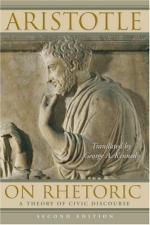|
This section contains 144 words (approx. 1 page at 400 words per page) |

|
Why does Aristotle not consider rhetoric an art?
What is the difference between dialectic and rhetoric?
What is the relationship between a demonstration and an enthymeme?
At several points in the work, Aristotle seems to recommend dishonest ways of persuading an audience of one's argument. Does Aristotle approve of these dishonest means?
In the chapter on happiness (Book I, Chapter 5) Aristotle gives several definitions of happiness. Are all of these definitions consistent with one another? If not, why does Aristotle not try to determine which is correct?
What is the difference between happiness and goodness?
Do the three applications of rhetoric—political, forensic, and epideictic—exhaust all of the possible uses? Are there others?
To what extent do Aristotle's rules of rhetoric apply in the modern world? Which rules seem to apply specifically to ancient Greece?
|
This section contains 144 words (approx. 1 page at 400 words per page) |

|



